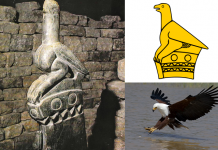By Elizabeth D.T Taderera
Imagine there is a girl you truly love and you want to spend the rest of your life with her- it’s all possible until you go through some formalities. Now, in the Iron-Age traditional Zimbabwe, when a man wanted another man’s daughter’s hand in marriage he would pay for it using a hoe. This was obtained from the well-known iron smelters of the Mbire clan in the Hwedza Mountains.
‘Why pay for someone you love’, you might ask- well this payment is different from when you are buying a pack of sugar from the store, in this case you are thanking the woman’s family for raising her and you are creating a relationship with her and her family. If the groom fails to present a hoe for lobola he would ask for ‘Kutema ugariri’, this meant that he would stay and work for his bride until the father-in-law was happy with his work. So one could say this was a way for the man to prove that he will be able to look after the woman once they were married.
As the times changed so did the customs. If a dating couple wishes to get married the boy and girl go to see the girl’s aunt ( her father’s sister) and tell her about their plans, who in turn will go and inform the girl’s father who will bring the whole family together to discuss setting a date for the ceremony. Thereafter, the groom and his family are informed of the set date. If an aunt was not present due to unforeseen circumstances a member of the father’s family would stand in for the aunt’s part.
The groom then looks for a ‘Munyai’ . This is one who will do the negotiating for him during the lobola ceremony. This person knows the customs and traditions of the girl’s family.
Prior to the day of the negotiations there is a ‘Makandinzwa nani kuti ndine mwanamusikana’ (how did you know I had a daughter), this is an introductory stage. The ‘Munyai’ requests the bride’s hand in marriage on behalf of the groom. This is when he is allowed into the village/ home of the bride. The bride’s family will ask the Munyai the name of the girl whom they wish to marry once it’s acknowledged the proceedings begin.
In some cases if the girl is already pregnant or has been living with the boy in some areas or traditions the ‘Munyai’ goes to the bride’s village and shouts ‘Matsvakirai Kuno’, and any villager / relative of the bride who hears him will chase him as an attempt to beat him but he is later allowed into the home to pass on his message. I have heard in some cultures for example the Ndebele culture the Munyai will come into the home of the bride and drop a box of matches without saying a word and dashes out avoiding being thrashed with a member of the family following closely behind him.
However once the message has been passed on, the Munyai is given a list to take to the groom’s family.
The stages of Roora vary from culture to culture in the order of payment and the names. These are as follows:
Zvidiki/ Zvibinge– these are small items on the list. For example, a wooden plate that is asked for by the bride’s family from the Munyai and if he has brought one he presents it. In the past the plate was provided by the bride’s family, but this changed since people started charging for them.
Vhuramuromo- in this stage it’s a small fee paid for greeting the guests, this is where fines may be imposed if the groom failed to meet an earlier date even if he notified the family in advance. This is done however in humor just to make the munyai feel comfortable.
Kunonga– where the woman being married is required to pick some money for herself, this money is set by the aunt or the woman’s sister. This money is for the bride to be to buy household utensils for her new home. This same money is shared upon the younger sisters for the cooking that would have taken place.
Matekenyandebvu
Pwanyaruzhowa or best described as damage is paid If the girl is pregnant or no longer a virgin or has been living under the same roof as the groom-to-be what is called.
The next stage is Zva Mai– here the gifts and money for the bride’s mother are presented, and this portion is non-negotiable. These include Mombe yeumai (a cow for the mother), mafukidza dumbu (a blanket), and mbatya dzaamai (mother’s dress).
Rusambo- which is the most important part of the lobola/roora. The groom usually would not be given his bride before paying ‘rusambo’. Here the family would request a cow or goats but nowadays it’s paid in cash.
Then there is Danga- given to the bride’s father. Traditionally it would be paid in live cattle but lately it has been cash and few live cattle. In addition to the individual parents’ gifts, the groom is expected to buy clothes as a gift for his in-laws, this is after the rusambo is paid. Normally this includes a suit for the father, a pair of shoes, a shirt, a hat, and umbrella and an overcoat.
Prior to the ceremony, a grocery list is given to the groom’s family and he should not bring less of the items required and not following the instructions on the list, is regarded as disrespectful.
The bride price is not paid all at once in some cultures, as the saying goes “the son in law is a fig tree that always bears fruits” meaning the son in-law will always be paying the bride’s family even long after a relationship has been formed. In some cultures it is a taboo for the bride price to be paid in full and in some it doesn’t really matter.
Some of these traditions are still being followed although some families take advantage of the groom and plot on making an earning off the bride to be. However this is one way in which two families are united to one after all the formalities are out of the way
























